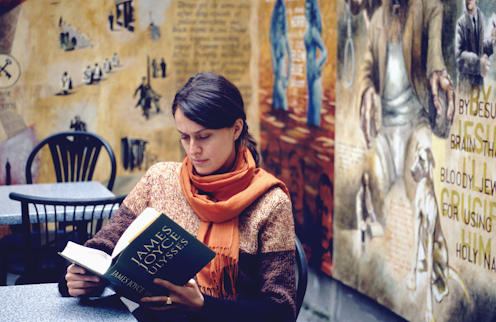
James Joyce’s Ulysses was first published 100 years ago. For a century, it has been seen as an intimidating read, but I’d like to challenge that. It is surprisingly accessible.
Set in Dublin on a single day (June 16 1904), Ulysses commemorated Joyce’s first date with his life partner, Nora Barnacle. Nora herself never cared to read it. Jim, she said, should have stuck to the singing.
It isn’t hard to see why she was put off. The first three chapters focus on Stephen Dedalus, Joyce’s sardonic portrait of his younger self as a philosophising drifter prone to giving lectures on Hamlet over pints.
Chapter three opens with Stephen considering the implications of his short sight: “Ineluctable modality of the visible”. The line is where many stop reading. But to start at chapter four is to begin a different Ulysses altogether.
Joyce’s everyman
The plot of Ulysses, such as it is, involves Stephen’s eventual meeting with Joyce’s everyman hero, Leopold Bloom.
Bloom is a middle-aged Jewish advertising salesman, married to a singer, Molly, who is on the brink of an affair with her louche manager Blazes Boylan. They have a daughter, Milly, who has just turned 15 and is working away from home as a “Photo girl” – part sales assistant, part model – in a seaside photography studio. But their other child, “poor little Rudy”, died 11 days after birth. Bloom is a father in search of a son, and Stephen a son in search of a father.
Read more: Ulysses at 100: why it was banned for being obscene
Joyce waits until chapter four, known as “Calypso”, to introduce Bloom, but the rich intensity of his inner life quickly displaces Stephen’s as Ulysses’s emotional centre.
“Mr Leopold Bloom ate with relish the inner organs of beasts and fowls,” the episode begins. And his breakfast — a pork kidney fried in butter — breaks multiple kosher food rules. The detail is a keynote for Bloom’s outsider unconventionality, and it indicates how Joyce roots character in the body as much as in the mind. Bloom is intellectually curious but essentially self-educated, and his entrance into Ulysses punctures the cerebral seriousness of the previous chapters.
“Milk for the pussens”
While Bloom potters around the kitchen making breakfast, Molly remains in bed upstairs, and so he talks to the cat. Their conversation counterpoints Bloom’s familiar “Miaow” with the cat’s idiosyncratic cries “Mkgnao!”, “Mrkgnao!”, “Mrkrgnao!”, “Gurrhr!”
The moment is more than a bravura exercise in feline phonics. It summarises Joyce’s commitment to representing another’s voice — even a cat’s. Bloom’s “Miaow” can be compared to a more conventional mode of narration — logically, sequentially, in full sentences. But “Mrkgnao” catches the cat’s modulating cry with more nuance than “Miaow” ever could. It is precisely attentive to the cat’s individuality.
Read more: Ulysses at 100: why Joyce was so obsessed with the perfect blue cover
Bloom’s monologue, clipped and brief like telegraph messages, is similarly idiosyncratic. The flow of his thoughts is caught with eloquent brevity: “Wonder what I look like to her. Height of a tower? No, she can jump me.” It allows readers complete immersion in his consciousness. No thoughts are private. We even accompany Bloom to the outside toilet, where he “allowed his bowels to ease themselves quietly as he read, reading still patiently that slight constipation of yesterday quite gone”. The moment, profoundly shocking to readers a century ago, confirms Joyce’s commitment to creating a character who can be more intimately known than any other in fiction.
The result of starting at chapter four is to read a novel where gossip, humanity, tenderness, and rich comedy coexist alongside avant garde experimentation. The world of Ulysses is rooted in everyday feelings, from hunger, constipation and drunkenness, to infidelity, grief and love. Those feelings are at Ulysses’s heart and explain its beguiling appeal to a century of readers. If you’d like to join them, start with chapter four — you might be hooked.
Katy Mullin does not work for, consult, own shares in or receive funding from any company or organisation that would benefit from this article, and has disclosed no relevant affiliations beyond their academic appointment.
This article was originally published on The Conversation. Read the original article.







